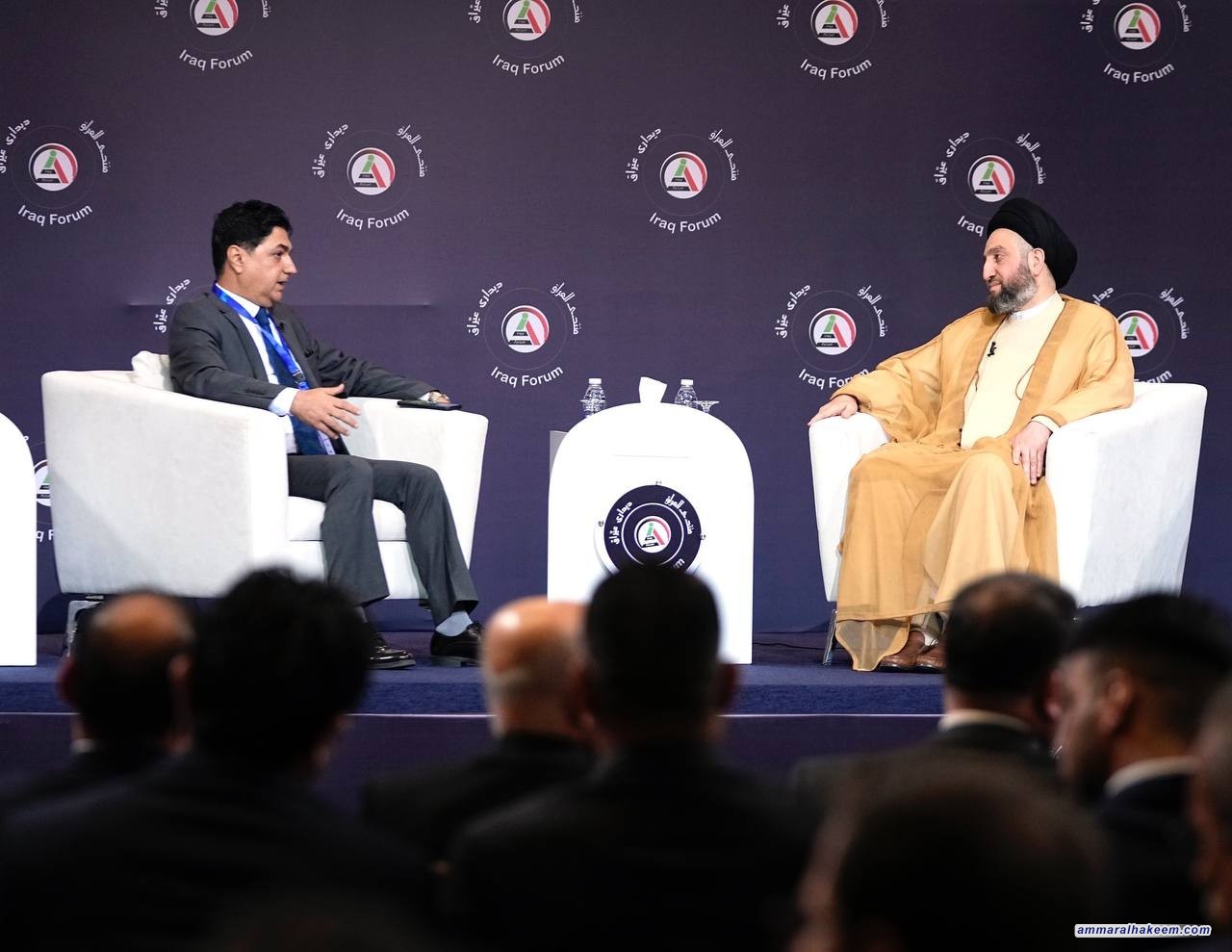Sayyid Al-Hakeem: measuring Iraq's experience success depends on deciding the State’s identity, the institutions’ strength, external relations, the value system nature, and the equation of balanced governance.
Sayyid Ammar Al-Hakeem, head of Al-Hikma National Movement, was hosted by the Iraq Forum and spoke about the nature of the political system and the challenges and priorities faced by Iraq. His Eminence pointed out that talking about the success or failure of the political system needs to be measured as to the nature of Iraq's changes and the external concerns, fears, and roles that accompanied the process of change.
H.E. stated that the success of the experience requires deciding the State's identity and philosophy, the nature of the visions, strategies, and priorities emanating from it, and the plans and programs resulting therefrom, stressing that the identity was not settled in its political, economic, and social dimension.
H.E. also confirmed that standards need a fair and balanced governance equation. These need regional balances and cross-component national alliances with the preservation of social balances. H.E. also noted the importance of institutionalism. H.E. added: "It needs an administrative revolution to address bureaucracy, fight corruption, a clear development, urban, and service vision, and that the strength of institutions and the role of individuals should have an inverse relation, the stronger the former the weaker the second and vice versa.” H.E. called to abandon the rentier State towards the quintuple of agriculture, industry, tourism, investment, and technology.
H.E. stressed the interest in components as an entry point for diversity and the urgent need to maintain the value system with all its political, economic, and social titles. We must recognize the existence of a value imbalance in the social aspect and as witnesses of drugs, organized crime, and other defects, calling for regional and international external relations as the fifth point in assessing State-building in Iraq's experience. H.E. affirmed that Iraq is approaching the end of the transition despite the complexities, and we have begun to live with security, political, and social stability.
H.E. referred to the nature of the political system and its relationship to the Constitution and said that the Constitution defined the form of the political system and we have problems with its application despite the Constitution's need for amendment in some places. H.E. pointed out that the political conflict that has occurred in the past has contributed to the development of theories leading to the emergence of a cross-component governing coalition of components in which all leaders meet to deliberate and consult, stating that the leaders’ meeting has become an ordinary event and no longer as an extraordinary event teeming with satellite TV.
H.E. referred to a new variable we must perceive, it is represented by the Government's commitment to the Government program and reviewing its every detail. He pointed out that Mr. Al-Sudani exhausted his successor, for the step has illustrated to the people the need for a program that binds the one who applies it according to clear priorities that only he takes responsibility for, adding “This goes on the framework of accumulating experiences and positives”.
In the subject matter of the Constitution, H.E. said that it needed to get closer to reality with agreed amendments. In some places, we need to bring reality closer to the Constitution, stating that the stability of the political system is measured by its ability to overcome and adapt to challenges and crises. And using the experience of October and how the political system maintained and opened the way for its representatives to express themselves in the upcoming parliament and dues.
H.E. illustrated some of the results of his Ramadan tour to the leaders of the region, noting that the common margin is the admiration of the Iraqi experience extent and the conviction that Iraq's stability is for the stability of the region, recalling that Iraq, by its size, stature, history, and wealth, is qualified to play a role in bringing perspectives closer among the region's factions and stressing the need for an inclusive framework for managing differences so that they do not turn into issues. H.E. called not to worry over differences, as it is a natural thing in a democratic multiple system, it’s important to establish rules to manage differences as they occur.


/9/3/photo_2025-12-10_09-25-13.jpg)
/9/2/photo_2025-12-10_09-17-58.jpg)
/9/1/photo_2025-12-10_09-11-13.jpg)
/8/3/photo_2025-12-09_10-42-49.jpg)
/8/2/photo_2025-12-09_10-37-31.jpg)
/8/1/photo_2025-12-09_09-54-18.jpg)
/7/1/photo_2025-12-08_09-38-41.jpg)
/5/1/photo_2025-12-07_09-25-35.jpg)
/3/2/photo_2025-12-04_11-05-55.jpg)
/3/1/photo_2025-12-03_11-49-28.jpg)